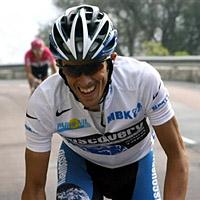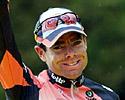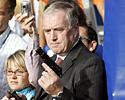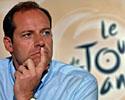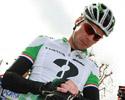First Edition Cycling News, March 8, 2008Edited by Laura Weislo with assistance from Susan Westemeyer Favourites emerge for Paris-NiceBy Hedwig Kröner
With just a few days to go before the start of the 66th Paris-Nice, it's difficult not to be haunted by a sense of déjà-vu, thinking of last year's run-up to the event. Like in 2007, the winner of the previous edition will not be competing in the race; but more importantly, the ongoing feud between the Grand Tour organiser ASO and the governing body of the sport, the UCI, has been drawing a huge grey cloud of the 'race to the sun', once again. A climax in the power struggle between ASO and UCI has been reached again: Last year, the organiser threatened to hold the event outside of the UCI calendar, with a last-minute peace agreement settling the matter just hours before the riders left the start line. This season, ASO went through on its anti-ProTour course and received the backing of the French cycling federation (FFC), which agreed to hold the event under its national regulatory framework. The UCI, in turn, threatened the participating teams and riders with heavy sanctions if they take the start line on Sunday, which prompted an emergency call at the Court of Arbitration for Sport. Two days before the race is set to take off in Amilly, the cycling family still doesn't know under which authority the race will take place and who will eventually be participating. On the one hand, teams and riders want to take part in the event and 'do their jobs'; on the other hand, however, the governing body of the sport threatens them with fines and suspensions if they do. Politics aside, the favourites for this year's edition after 2007 defending champion Alberto Contador, wasn't invited by organisers ASO along with the entire Astana team, include Contador's former team-mate, Luis Léon Sánchez, now riding for Caisse d'Epargne. The young Spaniard has openly declared Paris-Nice to be his first season goal this year, and we know he has the legs to do it. Sánchez won a stage in last year's edition, and finished third on General Classification in Nice. He had a promising season preparation at the Tour Down Under in Australia in January, where he finished eighth overall. Continue to the rest of the preview. Teams vote on Paris-Nice participation
With the start of Paris-Nice looming, the teams voted in favour of partipation in the race despite the threats of the UCI to level sanctions against them. On the same day, the Court of Arbitration for Sport (CAS) decided that it lacked the jurisdiction to rule on whether or not the UCI's sanctions are legal. In a meeting of the AIGCP (International Association of Professional Cycling Teams) held outside Paris on Friday, fifteen teams are reported to have voted in favour of racing while eight teams abstained. Rabobank was not present for the vote, while CSC, Quick Step, Liquigas, Saunier Duval, High Road, Milram and Astana, all abstained from casting a ballot. Silence-Lotto named its team for the start on Sunday. Mario Aerts, Christophe Brandt, Jurgen Vandenbroeck, Johan Vansummeren, Cadel Evans, Matthew Lloyd, Yaroslav Popovych and Dario Cioni will take the start in Amilly. CAS declined to rule on the legality of the threat of sanctions leveled by the UCI against any team which participates in the FFC-sanctioned event, leaving the riders facing suspensions of six months and 10,000 Swiss franc fines if they start the race as long as it is held outside the sanctioning of the sport's governing body. UCI president Pat McQuaid stood firm in his insistence that the teams will be punished for defying the rules of his organisation on Friday, but holds out hope that they will reconsider. "I'm still waiting for Sunday morning," McQuaid told Reuters. "If they voted in a majority, it means some have not voted for it and thus have been forced to break the UCI regulations. So until Sunday morning it's still wait and see. "The UCI has made it quite clear to the teams that they needed to be aware of the decision they make," McQuaid continued. "If they decide to go with ASO they have firmly taken the decision to be out of the UCI." "Teams who participate in Paris-Nice will be thrown out of the UCI," McQuaid said. UCI: ASO resorting to blackmailUCI president Pat McQuaid heavily criticised the Paris-Nice organiser ASO in an open letter to the French newspaper Le Monde Friday, on the same day his organisation announced that it will open disciplinary proceedings against the French Cycling Federation (FFC) and its president, Jean Pitallier, over its agreement to sanction the upcoming Paris-Nice. In a statement, the organisation criticised the FFC and Pitallier for betraying "their obligations of loyalty towards the UCI and the entire cycling community". The UCI also called for the resignation of AIGCP president Eric Boyer, and included the Frenchman in the disciplinary proceedings because he "encouraged members of the AIGCP to contravene the UCI rules by asking them to take part in Paris-Nice when the event is not on the UCI calendar, which means that member teams of the AIGCP are not entitled to take part in the race." In the letter to Le Monde, McQuaid warned against the precedent set by the ASO's move to run Paris-Nice outside the aegis of the UCI. "ASO is resorting to blackmail by using the Tour, which teams feel obliged to take part in from a financial point of view, and forcing them to choose between their short-term interests (participating illegally in the Paris-Nice in order not to risk being excluded from the Tour) and respect for an institution which guarantees the long-term health of their sport." He called the ASO's move "an act of sabotage" against his organisation, reiterating the threat of punishment for riders, teams and the French Federation, and claimed that the ASO's move threatens the "effectiveness of the anti-doping campaign." McQuaid went on to place the blame squarely on the ASO, writing, "the UCI cannot afford not to take these measures, however painful they may be. If anyone here bears a heavy responsibility, it is the directors of ASO." Cycling set for a showdown
Cycling seems less like a sport these days and more like a Hollywood western: the battle between the Wyatt Earp of cycling, UCI president Pat McQuaid, and the cattle-rustlin' cowboys of race organisation, the Amaury Sport Organisation (ASO), is set for the grand climax at this weekend's Paris-Nice. Life in Tombstone has become dangerous indeed in the past few weeks, and the townspeople - the riders and teams - have been forced into a position of diving for cover (see Track hopefuls skip Paris-Nice) or simply going about their daily business of racing while the bullets fly overhead. At stake is the future of not just the ProTour, but of the very authority of the UCI. The ASO has calmly gone about moving the race out from under the UCI's grasp while the governing body, backed into a corner, has fought back with threats of sanctions against the riders, the teams and even the French Cycling Federation. The ProTour teams association (IPCT) appealed to the Court of Arbitration for Sport (CAS) asking that it rule on the legality of the UCI's proposed sanctions, but CAS declined to take on the matter. What's left is for the riders to either toe the line on Sunday or not, and according to the AIGCP (Association of Professional Cycling Teams), the majority of the riders are in favour of taking the start. Whether the UCI will actually fine and suspend those on the start list remains to be seen, but the riders have already sought protection against any repercussions should the sanctions go through. Controversy from day one
If you've been sitting on the sidelines scratching your head and wondering, "how did we get here?", you're not alone. A quick glance through the history of the ProTour vs. Grand Tour conflict will show that the evolution of the new race series has led to a host of problems. Conceived as a way to elevate cycling to the stature of Formula 1 through a more unified and easily identifiable circuit of top professionals, the ProTour never got a chance to reach those lofty goals. From the very start, cycling's "Big League" came under harsh criticism from the Grand Tour organisers (GTs) who viewed the structure as "closed". Way back in 2004, ASO's Christian Prudhomme explained, "The ProTour is a closed four year system with no possibility of up or downgrading teams," he said. "If a team has a bad year, it still remains within the ProTour, but another team getting great results cannot move up into it. Instead of applying a similar system to soccer for example, [then UCI president] Hein Verbruggen chose to imitate the American closed structures of NBA, NHL or NFL. He also followed their franchise system, that he calls 'licenses'. And he obliges race organisers and teams to pay these rather costly licenses." We've heard Prudhomme and ASO boss Patrice Clerc rail against the "closed" system for the past four years, but wasn't that all solved when the races organised by the GTs were removed from the ProTour calendar? Not exactly, because while the UCI placed most of the GTs races on a separate calendar which allowed for organisers to invite more Professional Continental teams, they still insisted that all ProTour teams be invited to race the Tour de France. Prudhomme's words of 2004 put it succinctly. "For the organiser, it boils down to being tenant of a race, rather than owner of one." A long history
The argument has changed little since 2004. The UCI has attempted to promote the ProTour while fending off annual threats from the Grand Tours to leave the series. In 2005, the three Grand Tours organisers, ASO, RCS Sport and Unipublic announced they would separate from the ProTour and form their own 'Grand Tour Trophy'. After tense negotiations, the GTs plan was put on hold, and the Giro d'Italia, Tour de France and Vuelta a España were included in the ProTour during 2006 and 2007 after the UCI made a compromise. They agreed to reduce the number ProTour licenses from 20 to 18, opening up more wild card slots for the organisers, and to consider handing out licenses with a shorter term than the original four years, opening up the system to more teams. At the end of 2006, however, the UCI handed out 20 licenses anyhow, raising the ire of ASO president Patrice Clerc. The GTs responded by refusing to invite the Unibet.com team to Paris-Nice and most of their other events, and the crisis came to a head before last year's Paris-Nice. In a last minute negotiation, a temporary peace deal was arranged where the GTs would recognise the original 18 ProTour teams and treat the last licenses, Astana and Unibet.com as wild cards. In reality, that meant Astana was allowed entry into the Tour de France while Unibet stayed on the sidelines. The decision came back to haunt the ASO when Astana's Alexander Vinokourov tested positive for blood doping during the Tour and the team withdrew from the event. With only 18 ProTour teams left after the demise of Unibet.com and Discovery Channel, why should the GTs still object to the ProTour? The UCI still requires that the ProTour teams race in the Tour de France, although McQuaid has indicated that he may negotiate that point if the teams agree to it, giving a slight glimmer of hope that peace could be on the horizon. However, with less than 48 hours before the start in Amilly, it is highly unlikely that the UCI will be in charge of Paris-Nice no matter what peace deal can be worked out. With threats of suspensions hanging over their heads, the riders will take to the roads in Amilly, but who will be the last man standing? Cyclingnews' recent coverage of the ProTour-Grand Tours split
October 4, 2008 - New ASO chief to maintain values Cyclingnews' complete coverage of the ProTour-Grand Tours split Sinkewitz points to Klöden in German doping affairPatrik Sinkewitz reportedly admitted to the German authorities that his former team-mates Andreas Klöden and Matthias Kessler were with present on a trip to the Freiburg University clinic before the 2006 Tour de France where he took part in blood doping. The German daily Süddeutsche Zeitung said that Sinkewitz named both riders in a hearing earlier this week. The 27 year-old German who accepted his one year suspension for doping this week was threatened with jail time if he failed to co-operate with the investigation of the Bundeskriminalamt (German federal police). The former T-Mobile rider tested positive for testosterone prior to the 2007 Tour de France, and was the subject of a larger investigation into suspected widespread doping practices on the team in the years prior. The spokesman for the prosecutor's office in Freiburg confirmed that Sinkewitz was heard by investigators on Monday, but would not go further to reveal the content of the discussions. "I can confirm that Mr. Sinkewitz gave names, but for reasons related to the case, I can neither confirm nor deny the names circulating," said Wolfgang Maier. Sinkewitz admitted to using banned substances during his professional career, but had until this week refused to name any of his other team-mates. Sinkewitz admitted to traveling to the Freiburg clinic prior to the 2006 Tour de France to receive a blood transfusion around the same time his team-mates Jan Ullrich and Oscar Sevilla had been excluded from the race for being suspected of involvement in Operación Puerto. Klöden, who currently is part of the Astana team, has been accused German anti-doping crusader Werner Franke of taking part in the blood doping during the 2006 Tour. Voigt to lead CSC in Rund um KölnJens Voigt will lead Team CSC at the Rund um Köln later this month. The race organizers on Friday announced that CSC was the fourth ProTour team to agree to ride the race, along with Milram, Gerolsteiner and High Road. "Of course we are happy that Jens Voigt will be at the start of our 100th anniversary," said Alexander Donike, the race's technical director. "In the coming days we will announce other teams. In spite of all the financial difficulties in organizing our classic race, we hope to have some prominent names." He speculated that the race's new route would appeal to the breakaway specialist Voigt. "Because of the high cost, we we were forced to not ride the closing lap on the Rhine bridge. So we ride directly into the finish, which will help a breakaway." "CSC is fully built around its captain Jens Voigt," he continued. "Team manager Bjarne Riis is even leaving his sprinter, last year's winner Juan Jose Haedo, at home." 47 Nations for Track WorldsThe UCI have declared the names of 47 countries who have qualified to enter teams for the UCI Track Cycling World Championships in Manchester this month. The five day event commences on Wednesday 26th March with four key finals taking place on the first night. Britain's Bradley Wiggins is expected to be selected for the men's individual pursuit with qualifying in the morning session. The British team sprinters will be in action against tough teams like France, Netherlands, Germany and Australia. The fastest four teams from qualifying go through to contest the medals. Only the Netherlands has qualified to compete in all of the events. The Dutch team will be hopeful of medals in the sprint and endurance events. Willy Kanis is likely to contest the women's 500m time trial and Marianne Vos will be among the favourites for women's scratch race. 200m world record holder and current men's sprint world champion Theo Bos will also be in action on the first night in the men's team sprint. The British team qualified for all events except the women's team pursuit but can enter a team as host nation. The event debuts at the championships on Friday as will the British team likely to be led by Rebecca Romero Tickets for Saturday have already sold out but tickets are still remaining for Wednesday, Thursday, Friday and Sunday. See the official web site at www.worldtrackcycling.com for information Countries qualified to enter riders: Argentina, Australia, Austria, Belgium, Belarus, Brazil, Canada, Chile, China, Colombia, Cuba, Czech Republic, Denmark, Dominican Republic, Spain, Estonia, France, Great Britain, Germany, Greece, China Hong Kong, Indonesia, Iran, Ireland, Italy, Jamaica, Japan, Kazakstan, South Korea, Lithuania, Malaysia, Moldavia, Mexico, Netherlands, New Zealand, Poland, South Africa, Russia, Switzerland, Slovakia, Thailand, Chinese Taipei, Ukraine, Uruguay, United States of America, Uzbekistan, Venezuela. (All rights reserved/Copyright Future Publishing Limited 2008) |

|
January 2009 |
Recently on Cyclingnews.com |

